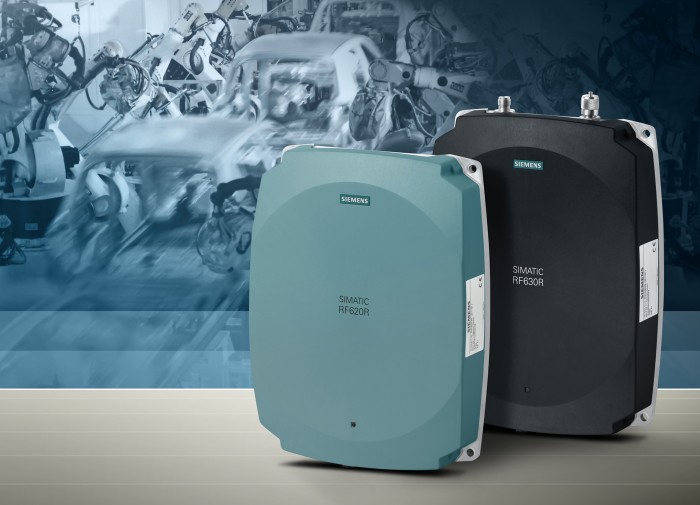Siemens optimizes UHF readers for use in industrial production
The Siemens Industry Automation Division has added new functions to the latest generation of RFID readers in its RF600 UHF system to optimize them for use in industrial production. The new functions ensure robust operation, even when several RFID readers are located in close proximity to each other. The readers use new algorithms to detect, read and write data storage media reliably, even in a difficult radio environment. This enables the Siemens UHF system to meet the specific requirements a production environment places on long-range, radio-based systems.

Photo by Siemens AG
The Siemens Industry Automation Division is showcasing its Simatic RF620R and RF630R UHF readers which have been modified for industrial production. The new generation of devices incorporates functions which have been specially designed to meet the exacting requirements of a production environment. Industrial production plants present a difficult challenge to radio-based systems for a number of reasons: The readers are sometimes located very close together and may influence each other. There is also only a small distance between the workpiece holders and therefore between the transponders which have to be detected individually. Metal surfaces reflect the signals transmitted by the readers, which leads to superimposition of the radio waves and consequently radio fade-out. Apart from reflections, higher transmit powers can lead to overreach, so that the reading ranges of the individual readers overlap or the wrong data storage media are read out.
Siemens has designed functions for the new Simatic RF600 readers which overcome these difficulties. Process stability is substantially increased by an adaptive transmit power and intelligent filtering of the reading results. The adaptive transmit power ensures a high recognition rate because the reader automatically increases its power until it clearly detects at least one transponder in its RF field. This not only reduces radio frequency interference but also compensates for radio fade-out.
The multi-stage filter concept designed by Siemens uses the radio characteristics to ensure that the correct transponder in the RF field of a reader is always read or written. The appropriate data storage medium is automatically selected on the basis of various indicators, such as the evaluation of the RSSI value (Radio Signal Strength Indicator), the reading frequency or the transmit power required.
Various mechanisms can be activated according to requirements. The inventory threshold filter ensures that the transponders within range are initially observed for a short period of time before being identified. Transponders that have already been processed can be stored in a blacklist in the reader and thus be filtered out immediately. The “Tag Hold” function maintains communication between a selected transponder and the reader by utilizing the maximum transmit power. This ensures that data can be exchanged between reader and data storage medium even under difficult radio conditions.
The new RF620R and RF630R devices are being introduced in three hardware versions based on the following standards: ETSI for Europe, FCC for the USA and Canada, and CMIIT for China. Future firmware updates can be handled using the Step7 programming software.
News Categories
- » NEWS HOME
- » Automation & Robotics
- » Industry 4.0
- » Material Handling
- » Sensors
- » Quality & Testing
- » Machine Vision
- » Laser & Optics
- » Metalworking
- » Motion Control & Drives
- » Hydraulics & Pneumatics
- » Process Industry
- » Renewable Energy
- » Agriculture
- » Home & Office Furniture
- » Environmental Tech

